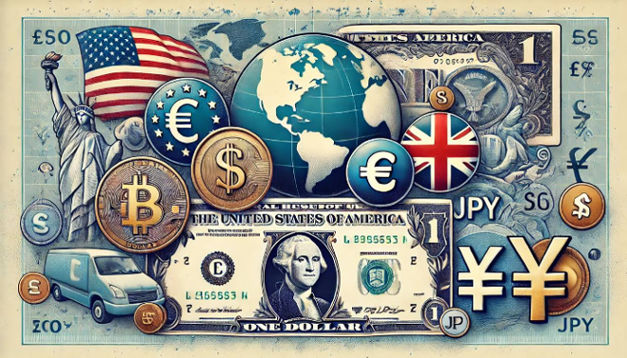
Before delving into the specifics of world-leading currencies, it is crucial to establish a foundational understanding of currency mechanics and exchange rate dynamics. Currencies serve as the monetary units utilized by nations for trade and commerce. Exchange rates represent the relative value at which one currency can be exchanged for another. These rates fluctuate based on a complex interplay of factors, including economic stability, inflation rates, and geopolitical conditions. A comprehensive grasp of these fundamentals is essential for appreciating the nuanced positions of the world’s most reliable currencies.
The Major Global Currencies:
1. United States Dollar (USD)
The United States Dollar (USD) is widely regarded as the most influential and stable currency globally. Its status as the world’s primary reserve currency, held extensively by central banks worldwide, underscores its dominance. The USD’s preeminence in international trade and finance is rooted in the economic might of the United States, its political stability, and the trust that global investors place in its financial system.
Key Factors Contributing to USD Supremacy:
- Global Acceptance: Widespread use in international transactions.
- Reserve Currency Status: Significant holdings by central banks globally.
- Economic Stability: Robust U.S. economic policies and performance.
2. Euro (EUR)
The Euro (EUR), the official currency of the Eurozone comprising 19 of the 27 European Union member states, holds a position of considerable influence. It stands as the second most traded currency worldwide, playing a pivotal role in international finance and trade. The collective economic strength of the Eurozone nations provides substantial support for its value.
Euro’s Strengths:
- Economic Power: Representation of one of the largest economic blocs globally.
- Stability: Prudent monetary policies of the European Central Bank.
- Widespread Usage: Utilized by over 340 million individuals.
3. British Pound Sterling (GBP)
The British Pound Sterling (GBP) is one of the world’s oldest and most respected currencies. Despite economic uncertainties precipitated by Brexit, the GBP maintains its position as a strong and reliable currency, buttressed by the UK’s robust financial sector.
GBP’s Enduring Strength:
- Historical Significance: Long-standing reputation for stability.
- Financial Sector Prowess: London’s status as a global financial hub.
- Economic Policy: Judicious UK economic management.
4. Swiss Franc (CHF)
The Swiss Franc (CHF) is renowned for its stability and reliability, often viewed as a “safe haven” currency. Switzerland’s strong economy, political neutrality, and sound financial policies contribute to the CHF’s status as one of the world’s preeminent currencies.
CHF’s Notable Attributes:
- Economic Stability: Switzerland’s robust economy and low inflation rates.
- Safe Haven Status: Preferred currency during global economic turbulence.
- Political Neutrality: Switzerland’s non-aligned stance enhances currency reliability.
5. Japanese Yen (JPY)
The Japanese Yen (JPY) ranks among the most traded currencies globally. Japan’s economic strength, technological advancements, and significant role in international trade solidify the JPY’s position as a reliable and influential currency.
JPY’s Key Strengths:
- Economic Power: Japan’s position as a leading global economy.
- Technological Leadership: Japan’s prominence in innovation and technology.
- Trade Influence: JPY’s substantial role in international commerce.

The Impact of Currencies and Exchange Rates on Global Trade
Currencies and exchange rates play a pivotal role in shaping global trade dynamics and economic health. Currency valuations significantly affect a country’s export and import prices, thereby influencing its trade balance. A strong currency typically reduces import costs while potentially hampering export competitiveness. Conversely, a weaker currency can stimulate exports but increase the cost of imports.
Exchange Rate Implications for Trade:
- Export Competitiveness: Currency depreciation can enhance export appeal.
- Import Costs: Currency appreciation can reduce import expenses.
- Investment Flows: Exchange rates influence foreign direct investment decisions.
Risk Management in Currency Exchange
Entities engaged in international trade often face exposure to exchange rate risks due to currency value fluctuations. To mitigate these risks, businesses employ various strategies such as hedging, forward contracts, and currency options. These financial instruments help stabilize costs and revenues, facilitating more predictable financial outcomes in international transactions.
Future Prospects for Global Currencies
As the global economy continues to evolve, the status of world-leading currencies may undergo shifts. Technological advancements, geopolitical developments, and economic policies will significantly influence the future landscape of global currencies. While the currencies discussed maintain their current positions of strength, it is prudent to monitor emerging trends.
Emerging Currencies of Note
While established currencies dominate the current landscape, certain emerging currencies are gaining prominence. The Chinese Yuan (CNY), for instance, is increasingly utilized in international trade and finance, reflecting China’s growing economic influence. Additionally, cryptocurrencies such as Bitcoin are challenging traditional currency paradigms, potentially reshaping the future of monetary systems.

In summation, the United States Dollar, Euro, British Pound Sterling, Swiss Franc, and Japanese Yen currently stand as the most reliable and influential currencies in the global economy. These currencies are underpinned by robust economies, stable political environments, and prudent financial policies, rendering them dependable options for international trade and investment. A thorough understanding of currency dynamics and exchange rate mechanisms is crucial for navigating the complexities of the global economic landscape. As the world continues to evolve, maintaining a keen awareness of these monetary issues will be instrumental in informing sound financial decision-making for both individuals and organizations operating in the international arena.